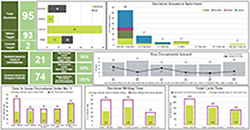Adjudication Reporting Dashboard
Fiscal 2022-2023: Results (April 1, 2022 to March 31, 2023)
-
The OEB has issued more than 260 decisions in Fiscal 2022-2023 – 98% of which were issued in accordance with performance standards (the OEB target is 90%).
-
Of all decisions issued, more than 80% were issued more than 14 days in advance of the decision metric date.
-
The OEB met all of its decision writing timelines including the approval of 12 complete settlement agreements for rate applications.
-
March 2023 was the month in which the most decisions (47 or 18% of all decisions) were issued by the OEB.

Click here for a print version (pdf)
Total Decisions Issued
The majority of decisions (81%) issued by the OEB were heard by Delegated Authority. This is consistent with Fiscal 2021-2022 where 79% of the decisions issued by the OEB were heard by Delegated Authority.
75% of the decisions issued in Fiscal 2022-2023 were for applications related to electricity.
43% of all the decisions issued were for Licence applications; Rates comprised 33% of decisions, followed by Facilities (16%) and MAADs (8%).
Decision Issuance Spectrum
In addition to monitoring whether a decision is issued on time or late, the OEB also monitors the degree to which decisions were issued early or late relative to the decision metric date established by the applicable performance standard. This Decision Issuance Spectrum highlights the fact that more than 80% of decisions issued this reporting period were issued more than two weeks in advance of the metric date.
Two panel decisions for QRAM applications (EB-2022-0173 and EB-2022-0174) were each issued four days late. On the day that the OEB was planning to issue these decisions, the applicant requested an additional change on its rate schedule. To address this, the OEB needed more time to finalize and issue the two decisions. Two other panel decisions for Franchise applications (EB-2022-0201 and EB-2022-0207) were also issued late. This was due to the fact that the OEB allowed evidence to be filed by the municipality in each application, a step which is not contemplated in the performance standards.
Key Documents Issued
The OEB issues many documents aside from decisions each month. Key Documents refers to all other documents that are issued by the OEB, but are not a final Decision and Order (e.g., Notice, Procedural Order, Letter to Industry, etc.). The OEB issued 35 Key Documents on average each month in Fiscal 2022-2023.
Average Time for Procedural Order No. 1 (PO#1), Decision Writing and Total Cycle
The OEB has committed to report on the performance of key application milestones for applications heard by panels of Commissioners for major application types. The three graphs illustrate the performance for various application types relative to the performance standard for:
This graph provides the average time from receipt of a complete application to the issuance of PO#1, and compares this to the performance standard.
This graph provides the average time from the close of the record to the issuance of the decision, and compares this to the performance standard. The average decision writing time for the Rates >$500M and Rates <$500M performance standards are much lower than the respective metrics of 90 and 60 calendar days because twelve applications heard under these performance standards all had full settlement proposals that were accepted by the panels of Commissioners. Full settlements generally reduce the amount of time required for decision writing relative to the performance standard.
A relatively small number of matters adjudicated by the OEB can involve significant policy matters, such as proceedings that develop a ‘policy framework’ to be employed in subsequent proceedings or generic proceedings applicable across a sector. There were two such proceedings in which the OEB issued decisions (EB-2021-0002 and EB-2021-0243). These proceedings do not have performance standards for total cycle time given their more unique nature. They have a performance measure of 90 calendar days assigned for the decision writing period.
This graph provides the average time from a complete application to the issuance of the decision, and compares it to the performance standard.